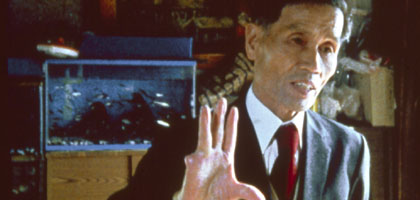
To the bitter end
DVD Review: The Emperor's Naked Army Marches On

Tim Lucas on a Japanese documentary that relentlessly probes painful memories of hell in the Pacific
Hara Kazuo; Japan 1987; Facets Video/Region 0; 122 minutes; Aspect Ratio 1.33:1; Features: 'The Memory of War' 12-page booklet
Japanese documentarist Hara Kazuo has described his mission as making "bitter films... A documentary should explore things that people don't want explored, bring things out of the closet, to examine why people want to hide certain things."
Facets Video is releasing a number of Hara's acidulous works on DVD - including Goodbye CP, his 2005 study of a poet with cerebral palsy; Extreme Private Eros Love Song 1974, an unflinchingly self-invasive memoir of a former lover; and A Dedicated Life (1994), about writer Inoue Mitsuharu's final struggle with cancer. But it is The Emperor's Naked Army Marches On that has become the emblem of Hara's work. Michael Moore hailed it as "an amazing piece of film-making", and it shares with Moore's work a sometimes painful confrontational edge that not only polarises audiences into feeling either righteously justified or embarrassed, but also simultaneously justified and embarrassed.
Executive producer Imamura Shohei, Hara's mentor, directed him towards his subject: Okuzaki Kenzo - a Pacific War veteran, one of only 30 survivors of a thousand-strong regiment, who dedicated his post-war life to forcing other survivors of Hirohito's imperialistic campaign to admit the crimes they committed against their fellow men in order to emerge alive. In 1982 and 1983, Hara accompanied Okuzaki as he drove a van placarded with anti-imperialist slogans into Tokyo and travelled with the brother and sister of two privates from his former New Guinea-based unit who were shot for desertion (supposedly) three days after the war officially ended, knocking on the doors of the soldiers' executioners and forcing them to own up to their shame. In civilised but jagged tones, Okuzaki informs these men - nearly all of them living anonymously and in near poverty - that he will use violence against them if they refuse to confess and so bring the troubled souls of the two privates to rest. Hesitantly, and in an at times roundabout way, truths are bullied into the open, painting a searing portrait of hell in the Pacific, where starving Japanese soldiers were forced to survive on the 'black pork' of New Guinea natives and the 'white pork' of enemy soldiers or, when lacking such, the flesh of the low-ranking and trouble-making among their own fellow soldiers. The testimony of one survivor - whom Okuzaki berates and physically attacks for claiming in a published memoir of his war years to have survived on worms and tree roots - indicates that other, worse things also took place, so harrowing that even 40 years on he still can't speak of them aloud.
No matter how violently charged these confrontations become, Hara's camera never stops rolling to intervene; nor does he editorialise to give the viewer an easy crib to know how sane or insane Okuzaki may be. Clearly, he's sincere and, in some cases, his intervention does some good; but there is also common sense in the observation of the officer who ordered the execution that Okuzaki is not soothing the spirits of the dead privates so much as chaining them to the moment of their deaths by refusing to let go of the past. This becomes more evident as the dead privates' siblings part company with Okuzaki, who snubs them as "undedicated" and continues his truth tour with his long-suffering wife and a male friend posing as the brother and sister.
Shot in 16mm, the film has been brought to disc by Facets in a standard, no-frills presentation that looks no more than serviceable. The day after viewing it, while watching television, I happened to surf past Master of the World, a 1961 film of Jules Verne's 1886 novel Robur-le-Conquérant starring Vincent Price, and was struck by many pronounced parallels. Okuzaki, I realised, was Robur come to life, a man who felt world peace must be achieved by any means necessary, his soul so eclipsed by that quixotic quest that he failed to see the monster he had become and the common sense that peace can only be achieved by living in peace.
